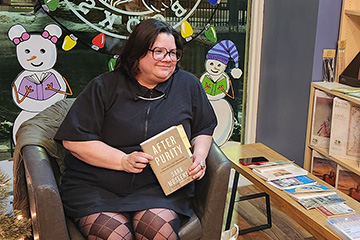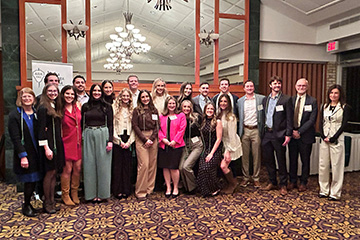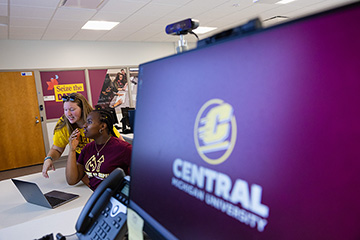Fighting tumors with spice
Students help faculty seek best way to deliver anti-inflammatory curcumin to cancer
Cassandra Thompson's college search strategy wasn't that unusual. Its outcome was.
The Portage (Michigan) Northern High School junior was looking at programs in psychology, neuroscience and pre-medicine. She reached out to Central Michigan University's Gary Dunbar, who was head of the neuroscience program in the College of Liberal Arts and Social Sciences.
He invited her to volunteer at CMU's Field Neurosciences Institute Laboratory for the summer.
"I thought that was incredible," she said. "In the summer before my senior year, I actually was able to come to CMU and take part in projects. It was more hands on than I had ever done. I decided right then that I was going to come here and do research."
Now she is a sophomore, taking part in research that aims to advance the use of curcumin in fighting glioblastoma tumors in the brain and neurodegenerative diseases, such as Alzheimer's, Parkinson's and Huntington's. She is working with faculty and students in neuroscience, chemistry and biochemistry.
"I want to direct a neuroscience program like this, one that is hands-on and gets you involved early. — Cassandra Thompson, student
Targeting the tumors
Research has shown that people in countries who ingest high amounts of curcumin over their lives have lower rates of certain cancers. Curcumin, a component of the spice turmeric, is noted for its antioxidant and anti-inflammatory effects.
But its ability to impact cancer and diseases is diminished because it hardly dissolves in water, so it is very difficult to get sufficient amounts into the bloodstream, said Ajit Sharma, a chemistry and biochemistry faculty member in the College of Science and Engineering.
To make the curcumin soluble, Sharma turned to fellow faculty member Douglas Swanson, who designed a dendrimer — a nano-sized molecule — that would make the change and deliver it through the blood-brain barrier to the targeted tumors.
Extending quality of life
Preliminary research by Julien Rossignol, associate professor of neuroscience in the College of Medicine, and his team has shown that when mice with brain tumors received a high dose of curcumin into their brains, their lives were extended about eight days.
That is equivalent to about one to three years for a human, said John Gallien, a neuroscience doctoral student working on the team.
And it is not just that they stayed alive, but they were able to function relatively normally, added doctoral student Bhairavi Srinageshwar. That's comparable to extending a person's quality of life for years, she said.
"We are on to something," Rossignol said. "Now we need to find out the most effective formulation."
Preparing for a career
Thompson's role in the research is to document how much of the curcumin actually is going into the cells.
She likes where this road is taking her.
"Doing this work is pretty cool," she said. "Having done all these procedures and learned the protocols will help me get into and excel in graduate school."
Her goals are high.
"I want to direct a neuroscience program like this, one that is hands-on and gets you involved early."




